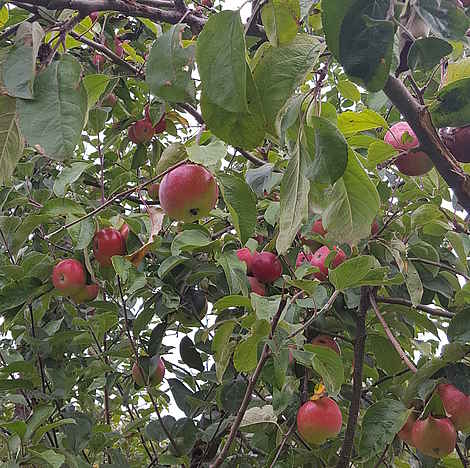Bacteria play an essential role in human and plant health. The microbial diversity of vegetables, fruit and herbs and their interaction with the environment is still little studied. For example, diversity is determined by the genotype of the plant, varies between underground and above-ground structures and is significantly influenced by soil quality, among other things. Apples are one of the most widely consumed fruits in the world. Studies show that eating apples can change the composition of the intestinal bacterial flora in humans, leading to health benefits. However, little is still known about how exactly bacterial communities from apple fruit colonise the gut. One research question of the study by Wassermann et al. (2019) was to what extent the apple microbiome is influenced by the farming method, biodynamic versus conventional, and whether the amount and composition of bacteria differs in different fruit tissues [1].
Study conduct
The "Arlet" apple variety was used for the study. The biodynamically (Demeter) and conventionally produced apples were grown in Styria (Austria). In contrast to the Demeter apples, the conventional apples were treated as follows after harvesting: stored in a controlled atmosphere for a short time immediately after harvesting, washed and packaged in PE film for sale. In the laboratory, the researchers visually inspected all the apples for shape, size, colour, flawlessness, firmness and freshness. They selected four apples from each type of cultivation and extracted microorganisms from the stem, stem end, calyx end, peel, fruit pulp and seeds. They homogenised the respective samples separately. They then analysed the DNA of the samples, compared the results with databases and measured both the number of gene copies per gram and the microbial diversity for both cultivation systems, examining the colonisation pattern of the bacteria using fluorescent in situ hybridisation.
Results
Overall, the amount of bacteria did not differ significantly between biodynamic and conventional apples (4.85 x 107 vs. 4.67 x 107 rRNA gene copies per gram). However, it varied strongly and for the most part significantly between the analysed tissues. The stem and seed had the highest bacterial abundance (approx. 1.54 x 108 and 1.26 x 108 gene copies per gram respectively), while the peel had the lowest (4.49 x 104). In terms of diversity, it was shown that the Demeter apples had a significantly more diverse microbiota than the conventional apples. The difference was even greater when comparing the different apple tissues of the two cultivation methods. With the exception of the calyx end, all parts (stem, stem end, peel, fruit pulp, seeds) showed a significantly higher diversity in the Demeter apples. It was even highest in the fruit pulp and peel.
Discussion
It is interesting to note the differences in microbial colonisation, both in terms of quantity and diversity, in the different apple tissues. This makes perfect sense. A high amount of bacteria was found in the samples of seeds, stems and stem ends, while the peel and fruit pulp were less densely colonised. However, the latter two had the highest diversity. These differences are related to the different functions of the various tissues. The peel and fruit pulp protect the seeds and enable their development. Diversity is high in these areas. In the seeds themselves, on the other hand, the amount of bacteria is high, which in turn is important for reproduction. The form of cultivation also has an influence here: if there is a rich microbiota in the areas of the plant seeds, the plant is able to develop healthily.
A freshly harvested apple harbours around 100 million bacterial gene copies. However, it is not so much the quantity as the diversity of microorganisms that is decisive for the health effect. If plants grow in healthy soil that is cultivated without chemical fertilisers, a rich diversity of bacteria can develop not only in the soil but also in the plants. This is shown by the results of this study. Further studies have shown that the bacteria associated with fruit and vegetables can be detected in the human gut [2]. If the diversity is high, pathogenic bacteria are suppressed. The researchers also suspect a connection between the bacteria found in Demeter apples and a lower risk of allergy to apples. The bacteria have structures that, similar to apple polyphenols, can minimise allergic reactions. In contrast, the conventional apples had potential pathogens. These correlations emphasise how important the soil-plant-intestinal microbiome axis is [1]. If we consider this further, it becomes clear from the context that health can only be achieved if all parts, from the soil to the plate, are healthy; it is therefore about the one single health for people and planet.
Bibliography
[1] Wassermann B, Müller H, Berg G (2019): "An apple a day: Which bacteria do we eat with organic and conventional apples?" Front. Microbiol. 10:1629.doi: 10.3389/fmicb.2019.01629
[2] Wicaksono WA, Cernava T, Wassermann B, Abdelfattah A, Soto-Giron MJ, Toledo GV, Virtanen SM, Knip M, Hyöty H, Berg G (2023): "The edible plant microbiome: evidence for the occurrence of fruit and vegetable bacteria in the human gut" Gut Microbes, 15:2, 2258565, DOI: 10.1080/19490976.2023.2258565
